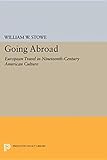Going Abroad : European Travel in Nineteenth-Century American Culture / William W. Stowe.
Material type: TextSeries: Princeton Legacy Library ; 5198Publisher: Princeton, NJ : Princeton University Press, [2017]Copyright date: ©1994Description: 1 online resource (272 p.) : 5 halftonesContent type:
TextSeries: Princeton Legacy Library ; 5198Publisher: Princeton, NJ : Princeton University Press, [2017]Copyright date: ©1994Description: 1 online resource (272 p.) : 5 halftonesContent type: - 9781400887347
- 818/.30809355 23
- online - DeGruyter
| Item type | Current library | Call number | URL | Status | Notes | Barcode | |
|---|---|---|---|---|---|---|---|
 eBook
eBook
|
Biblioteca "Angelicum" Pont. Univ. S.Tommaso d'Aquino Nuvola online | online - DeGruyter (Browse shelf(Opens below)) | Online access | Not for loan (Accesso limitato) | Accesso per gli utenti autorizzati / Access for authorized users | (dgr)9781400887347 |
Browsing Biblioteca "Angelicum" Pont. Univ. S.Tommaso d'Aquino shelves, Shelving location: Nuvola online Close shelf browser (Hides shelf browser)

|

|

|

|

|

|

|
||
| online - DeGruyter Iuzovka and Revolution, Volume II : Politics and Revolution in Russia's Donbass, 1869-1924 / | online - DeGruyter History, Prophecy, and the Stars : The Christian Astrology of Pierre d'Ailly, 1350-1420 / | online - DeGruyter Self-Motion : From Aristotle to Newton / | online - DeGruyter Going Abroad : European Travel in Nineteenth-Century American Culture / | online - DeGruyter Clear and Simple as the Truth : Writing Classic Prose / | online - DeGruyter Mecca : A Literary History of the Muslim Holy Land / | online - DeGruyter Citizens without Sovereignty : Equality and Sociability in French Thought, 1670-1789 / |
Frontmatter -- Contents -- Preface -- Acknowledgments -- 1. Americans Abroad -- 2. Travel as Ritual -- 3. Guidebooks: The Liturgy of Travel -- 4. Travel Chronicles: Testimony and Empowerment -- 5. Ralph Waldo Emerson: The Reluctant Traveler -- 6. Margaret Fuller and the Discourses of Travel -- 7. The Innocents in Europe: Twain, Travel Humor, and Masculinity -- 8. Henry James, or The Merchant of Europe -- 9. Henry Adams, Traveler -- Afterword -- Notes -- Works Cited -- Index
restricted access online access with authorization star
http://purl.org/coar/access_right/c_16ec
In a nation struggling to establish its own identity, all kinds of Americans, for all kinds of reasons, were enchanted with Europe. A European trip, whether extravagant or modest, could serve social advancement, aesthetic enrichment, or personal curiosity. Travel allowed men and women, the descendants of European settlers or African slaves, to shed their familiar surroundings and comfortable personas, adopt new roles, and measure themselves against the European experience. These travelers were often also writers. Throughout the nineteenth century, celebrated authors and beginners alike published newspaper columns, magazine articles, guidebooks, travel essays, letters, and novels based on their European journeys. In Going Abroad, Stowe examines not only classic works by such writers as Irving, Fuller, Twain, James, and Adams, but also lesser-known works by African-American authors, journalists, feminist writers, and diarists. Travel and the writing of it were important, Stowe argues, in molding a peculiarly democratic, yet essentially class-based, sense of personal and group identity. Combining literary and cultural analysis, he suggests new ways of understanding nineteenth-century Americans' concept of their nation and its place in the world.Originally published in 1994.The Princeton Legacy Library uses the latest print-on-demand technology to again make available previously out-of-print books from the distinguished backlist of Princeton University Press. These editions preserve the original texts of these important books while presenting them in durable paperback and hardcover editions. The goal of the Princeton Legacy Library is to vastly increase access to the rich scholarly heritage found in the thousands of books published by Princeton University Press since its founding in 1905.
Mode of access: Internet via World Wide Web.
In English.
Description based on online resource; title from PDF title page (publisher's Web site, viewed 24. Aug 2021)


